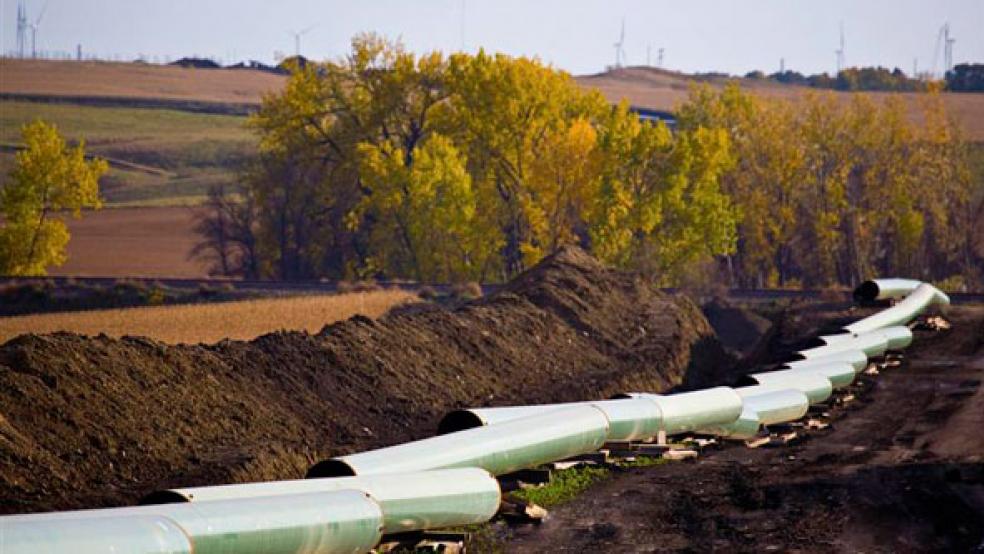The Keystone XL Pipeline cleared another major hurdle last week and in the process rekindled a long-simmering dispute over the potential economic benefit of the $54 billion TransCanada project to the U.S. economy.
The petroleum industry, labor groups and many Republican and Democratic lawmakers who favor the Pipeline insist it would generate tens of thousands of well-paying jobs while pumping billions of dollars into a still struggling U.S. economy.
Related: State Dept. Study Boosts Keystone Pipeline Prospects
AFL-CIO President Richard Trumka told The Washington Post last week, "We think that anything that's going to create jobs, help the country and do it in an environmentally sound way ought to be done." American Petroleum Institute officials say approval of the full pipeline could “support 42,000 jobs” and “put $2 billion in workers’ pockets during its construction.”
Environmental groups that have battled the project for the past five years say the economic benefit has been vastly overblown, and that once the pipeline is built, there would be fewer than 50 permanent jobs connected with the pipeline in the U.S. and Canada.
Anthony Swift, an attorney with the Natural Resources Defense Council, said derisively that the number of construction jobs generated by Keystone would be comparable to the construction crew of a “medium-sized shopping mall.”
“It’s not a national jobs policy,” Swift said in an interview Monday. “The argument that Keystone XL is something that needs to happen to put Americans back to work is really overblown. We’re not looking at a jobs-creating vehicle of any significance.”
Related: Canada Warns Obama on Keystone XL Pipeline
NRDC, the Sierra Club and other environmental groups have vigorously opposed the pipeline – warning of the dangers of oil spills, serious damage to wildlife and ground water, and worsening climate change. According to one estimate the 830,000 barrel a day would add 1.2 billion metric tons of carbon pollution to the atmosphere over its 50-year estimated lifespan.
Last Friday, the State Department issued a much anticipated final environmental assessment – one that boosted the case for industry proponents. The report found that the proposed 875-mile pipeline between Alberta, Canada and U.S. refineries along the Gulf Coast probably wouldn’t alter global green-house gas emissions.
That’s because even if President Obama were to side with environmentalists and permanently block the pipeline construction, the Canadians would almost certainly continue to develop their oil sands and ship the crude oil across the United States by rail.
“We believe this is the job project that has been sitting on the shelf for way too many years,” said Sabrina Fang, a spokesman for the American Petroleum Institute, an industry group. “The president’s own State Department has said in many reports now that this project will create more than 42,000 jobs to build the pipeline – that’s indirect and direct jobs.”
Related: Obama Climate Plan - Trade-off for Keystone XL Pipeline?
“And this is a great infrastructure project that will enhance our energy security,” she added. “The fact of the matter is – I don’t think many people know – we can be North American self-sufficient in liquid fuels in about a decade if we get more Canadian energy, and combine that with our own U.S. production.”
Almost from the beginning, the tar sand industry has been pitching its pet project as a national jobs generator. In the early going, industry proponents boasted that the Keystone XL would create “hundreds of thousands” of jobs, Swift recalled, while some in the news media speculated that it might bring as many as a million jobs.
Later, oil companies, the API, many politicians and a few unions who urged the State Department to approve the pipeline framed Keystone XL as an economic game changer. They claimed it would be the source of 20,000 “direct jobs” – meaning primarily construction workers – and 108,000 “indirect jobs,” which could mean anything from suppliers to restaurants feeding crew members.
API also cites numbers from the Canadian Energy Research Institute that the pipeline could “support” 117,000 new American jobs associated with oil sands development by 2035.
Last August, Obama pooh-poohed the industry’s claims, saying that in a workforce of more than 150 million Americans, the Keystone XL tar sands pipeline would be a "blip relative to the need."
“We’ve seen people mock these job numbers,” Fang, the spokesperson for API, said. “But the fact of the matter is, a job is a job. These are good-paying jobs and if you want to talk about construction work, all construction jobs are temporary jobs.”
Top Reads from the Fiscal Times:
- Senate Will Try Again to Extend Unemployment Insurance
- Paul Ryan’s New Idea is Really Smart—But Will It Fly?
- McCain Censure the Latest Sign of GOP Fratricide





